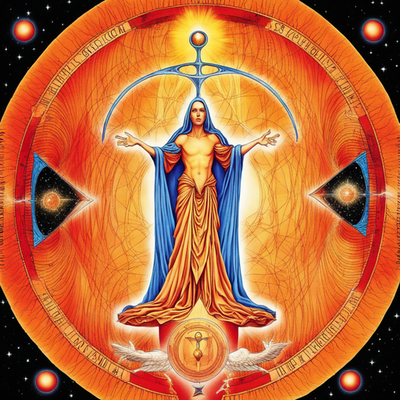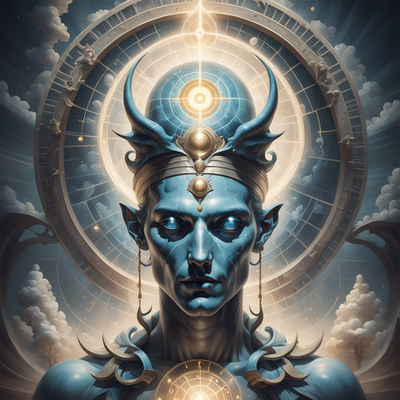Omens of Millennium
A Gnostic Journey Through Time and Imagination by Harold Bloom



Harold Bloom, a literary critic renowned for his works on Shakespeare and the Western Canon, took a different route with his book "Omens of Millennium." Delving deep into spirituality, the text transcends conventional literary criticism to become what Bloom himself calls a "Gnostic sermon." What sets it apart is its notably inner-directed approach to spirituality; an approach deeply rooted in creativity and imagination .
To understand "Omens of Millennium," it's crucial to have a grasp of Gnosticism—a religious and philosophical movement originating in the early Christian era but with roots that stretch back even further. Gnosticism focuses on personal spiritual knowledge ('gnosis') as opposed to orthodox teachings. It places a strong emphasis on inwardness and the esoteric, often tapping into ancient scriptures for wisdom.
In describing his book as a "Gnostic sermon," Bloom aligns himself with a tradition of spiritual inwardness. The text explores the significance of omens, dreams, and prophetic visions, delving into their historical contexts but also how they might be personally meaningful. It pulls from myriad sources, from Sufi mysticism to Kabbalistic teachings, all the while asking the reader to turn inward and consider these topics' relevance to their spiritual life. In this way, Bloom follows in the Gnostic tradition of valuing personal insight over doctrinal dictums.
Another distinguishing feature of "Omens of Millennium" is its commitment to creativity and imagination. While it is not uncommon for spiritual texts to encourage reflection and deep thought, Bloom's work particularly champions the role of imaginative contemplation. This is especially apparent in how he interprets various spiritual phenomena—not as strict dogma, but as metaphors open to creative interpretation.
For instance, the topic of angels is not confined to theological debate but is expanded upon as a product of human imagination, a phenomenon through which we can explore facets of our consciousness. Similarly, Bloom's discussion on prophecy goes beyond literal future-predicting to an inquiry into the very nature of time and reality.
Bloom's exploration is notably inner-directed, a quality that aligns with the Gnostic emphasis on inner experience over external ritual or dogma. The "sermon" encourages readers not just to understand but to experience spirituality, thereby making the text not just an intellectual exercise but a journey of the soul.
"Omens of Millennium" stands as an unusual but compelling work in Harold Bloom's literary portfolio. It is an enriching text that defies categorization, offering a blend of scholarly analysis and personal reflection. Through its Gnostic lens, the book creates a space where spirituality is not a realm separated from daily life but deeply intertwined with our innermost thoughts, dreams, and imaginative power.
In this era where spirituality often becomes an external spectacle or a set of moral rules, Bloom's inner-directed approach provides a refreshing and deeply meaningful alternative, echoing traditions that reach all the way back to the ancient world
LIFE AND LITERATURE!
To understand "Omens of Millennium," it's crucial to have a grasp of Gnosticism—a religious and philosophical movement originating in the early Christian era but with roots that stretch back even further. Gnosticism focuses on personal spiritual knowledge ('gnosis') as opposed to orthodox teachings. It places a strong emphasis on inwardness and the esoteric, often tapping into ancient scriptures for wisdom.
In describing his book as a "Gnostic sermon," Bloom aligns himself with a tradition of spiritual inwardness. The text explores the significance of omens, dreams, and prophetic visions, delving into their historical contexts but also how they might be personally meaningful. It pulls from myriad sources, from Sufi mysticism to Kabbalistic teachings, all the while asking the reader to turn inward and consider these topics' relevance to their spiritual life. In this way, Bloom follows in the Gnostic tradition of valuing personal insight over doctrinal dictums.
Another distinguishing feature of "Omens of Millennium" is its commitment to creativity and imagination. While it is not uncommon for spiritual texts to encourage reflection and deep thought, Bloom's work particularly champions the role of imaginative contemplation. This is especially apparent in how he interprets various spiritual phenomena—not as strict dogma, but as metaphors open to creative interpretation.
For instance, the topic of angels is not confined to theological debate but is expanded upon as a product of human imagination, a phenomenon through which we can explore facets of our consciousness. Similarly, Bloom's discussion on prophecy goes beyond literal future-predicting to an inquiry into the very nature of time and reality.
Bloom's exploration is notably inner-directed, a quality that aligns with the Gnostic emphasis on inner experience over external ritual or dogma. The "sermon" encourages readers not just to understand but to experience spirituality, thereby making the text not just an intellectual exercise but a journey of the soul.
"Omens of Millennium" stands as an unusual but compelling work in Harold Bloom's literary portfolio. It is an enriching text that defies categorization, offering a blend of scholarly analysis and personal reflection. Through its Gnostic lens, the book creates a space where spirituality is not a realm separated from daily life but deeply intertwined with our innermost thoughts, dreams, and imaginative power.
In this era where spirituality often becomes an external spectacle or a set of moral rules, Bloom's inner-directed approach provides a refreshing and deeply meaningful alternative, echoing traditions that reach all the way back to the ancient world
LIFE AND LITERATURE!